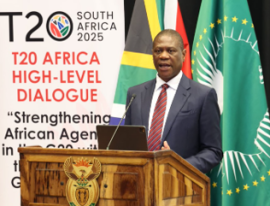
PRETORIA, April 30 (NNN-SANEWS) — South Africa’s Presidency of the Group of 20 (G20) has been a significant milestone for African representation in global economic decision-making.
This is according to Deputy President Paul Mashatile, who underscored Africa’s strategic vision to reshape global economic frameworks and assert the continent’s interests on the world stage.
Delivering a keynote address at the T20 Africa High-Level Policy Dialogue in Pretoria, he emphasised both the continent’s potential and its challenges.
“This gathering emphasises the need for Africa to address the persistent challenges of economic development, political instability, and governance weaknesses.
“It calls for a critical evaluation of current interventions aimed at strengthening Africa’s priorities, including economic growth, sustainable development, and global governance reforms. Africa is ours, and we must create the Africa we want,” the hold the attendees.
The T20, or Think 20, produces, discusses, consolidates and presents ideas on how to face current and emerging challenges that may be addressed by the G20.
Key themes included leveraging the continent’s young population, promoting the African Continental Free Trade Area (AfCFTA), and addressing systemic challenges such as unemployment, especially youth joblessness, infrastructure gaps, and economic marginalisation.
The country’s second-in-command stressed the importance of digitalisation, artificial intelligence, and emerging technologies as critical tools for African development.
According to the Deputy President, South Africa’s representative underscored the significance of the African Union’s new permanent membership in the G20, calling it a “transformational moment in global governance”.
He said South Africa’s Presidency’s theme of “Solidarity, Equality, and Sustainability” aims to reimagine multilateralism and prioritise the needs of the Global South.
Critical priorities include mobilising finance for a Just Energy Transition, ensuring debt sustainability for developing economies, and creating strategic approaches to critical mineral development that prioritise local value addition.
Mashatile believes that the dialogue represents a crucial step in positioning Africa as an active participant in global economic discussions, rather than a passive recipient of international policies.
He said Africa currently stands at a crucial juncture in its development journey, with a growing population and vast natural resources, yet it remains underdeveloped.
The Deputy President is of the view that the presence of a youthful population offers a range of possibilities for the development of the continent.
He also touched on the challenges facing multilateralism, which have been apparent for an extended period.
“Therefore, we should take a dim view and strongly discourage the erosion of multilateralism, as it poses a potential threat to global growth and stability. A fair, transparent, equitable, and inclusive international order is essential for economic stability and sustained growth.”
He warned that the ongoing trade tensions may result in a rising cost of living due to increased prices, particularly for manufactured goods, potentially exacerbating the sluggish economic growth across our continent.
“It is necessary that we respond collectively and decisively as Africans, while increasing capacity and capability to reduce dependency.“
According to the Deputy President, a fair, inclusive global order is possible, but it requires leadership grounded in equity, responsibility, and cooperation.
“The G20 should form part of this as we seek to unite as country states and develop policies that are progressive for the interest of all. We intend to work with like-minded countries and progressive institutions to establish a more equitable, representative, and just international order.”
While the G20 is not a substitute for existing international institutions, he said it must complement and accelerate progress on already agreed global commitments.
“Let us remember that the strength of the G20 lies in its diversity and inclusivity. Strengthening African agency within this framework not only empowers African States but also increases the credibility and efficacy of global governance.
“South Africa’s G20 Presidency will remain accountable to the continent and to its people.” — NNN-SANEWS



